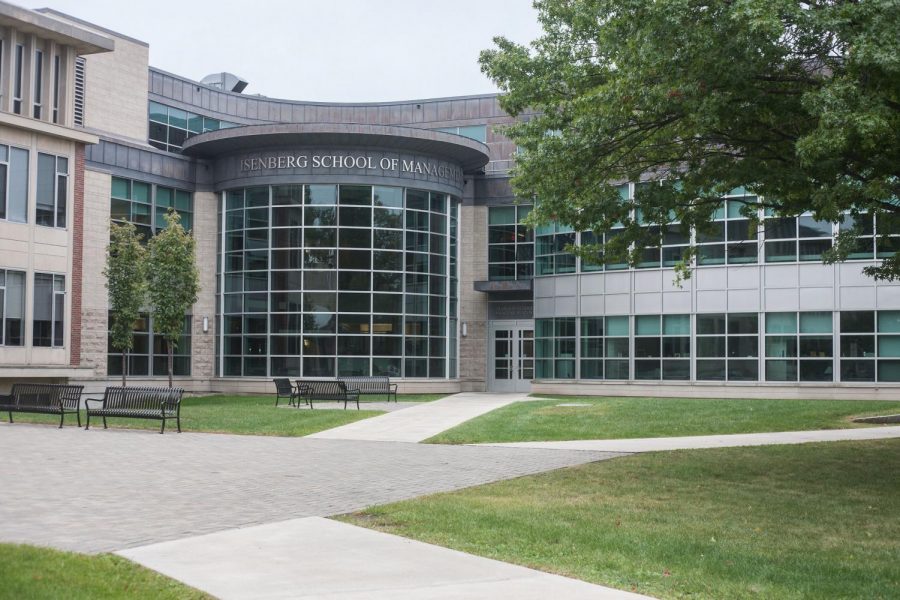Hundreds of students from the University of Massachusetts Isenberg School of Management filled Mahar Auditorium Tuesday night for the Association of Diversity in Sport’s annual Sport Talk Series.
This year’s talk, “Every Yard Counts: A Conversation on Football Analytics,” featured three speakers, Dean Oliver, vice president of data science at TruMedia, an engineering firm that focuses on sports analytics, Diane Bloodworth, CEO and founder of Competitive Sports Analysis and ISOM, and graduate and director of scouting development at The Scouting Academy, Dan Hatman.
The event was moderated by Sydney Robinson, a UMass sport management major and the president of Sport Analytics Club. He said that their goal within the club, which also helped to organize the event, is “to have discussions around and provide opportunities for as many kids to analyze data and sport on the business side and on the player personnel side.”
The speakers tracked their experience in sports analysis and what they have seen in the origins of the field. Oliver, having been the first analytics consultant in the NBA, cited the extent to which starting early in the field of data analysis has helped teams.
“You can look at the teams that are generally at the top of the standings right now,” Oliver said. “Houston, Boston, Golden State, San Antonio, those teams adopted early. This is how you gain an advantage.”
“We thought it was a good idea to get a topic that’s growing more and more in the industry,” said Jihwan Yoon, a finance and sport management double major and director of marketing for the Association of Diversity in Sport.
The speakers also referred to the nature of data analysis as a field that is constantly evolving. Bloodworth described how even though there is a tremendous amount of information available, it is still very separate.
“I think what we’re going to see over time is the integration of that data,” Bloodworth said.
Furthering this idea, Hatman discussed being able to quantify success on a football field by looking at what each yard gained meant in terms of later success.
“We all want production, we all want performers,” he said. “From the evaluation side, it’s always been intriguing to look at how that production occurred.”
There was some disagreement between the panelists on what could be possible with the data available, with Hatman stating that researchers could soon isolate incredibly specific variables when determining why a player had dropped a specific pass. Oliver countered with his belief that it will always take a human eye and an understanding of the game to figure out certain aspects of the plays they’re viewing.
A central element of the talk was what the speakers believe may be the future of sports analytics, with Oliver saying that there will be an “evolution of what we can measure.” Bloodworth agreed, discussing the idea that there are indicators for the athletes that make it to high school, college and the NFL, as well as that the data collection she has worked on will eventually be able to identify these elements.
Following questions by Robinson, the panel was asked questions that the audience had sent in via Twitter, which varied from questions from UMass athletes on how analysts judge a college athlete’s academics to what they thought of NFL Draft prospect Baker Mayfield.
The panel concluded with advice for students looking to succeed in their field. Hatman stressed that it takes combination of knowledge and networking to get opportunities, but also noted that nothing is guaranteed.
“You want to work in sport?” Hatman asked. “You’ve got to make a jump and take a risk.”
Will Katcher can be reached at [email protected] and followed on Twitter at [email protected].




















